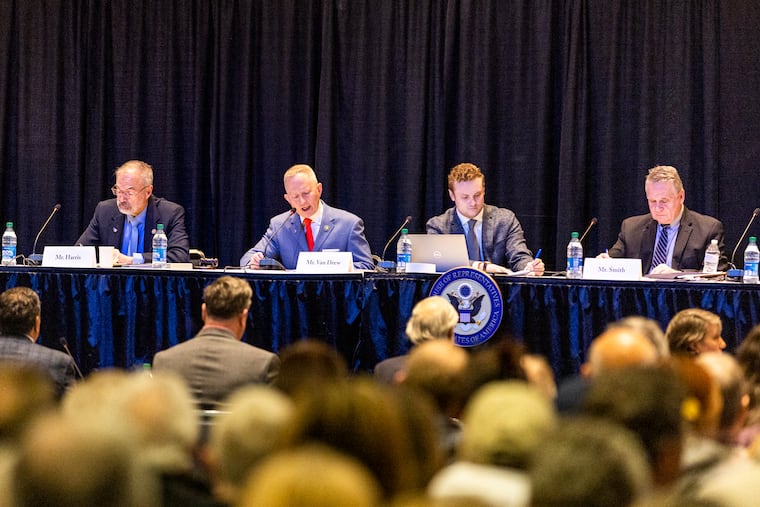Opponents of N.J. wind farms say whale deaths should put project on pause for further studies
Whales have been washing up on Jersey beaches for months. Wind farm opponents blame sonar from surveying boats. The National Oceanic and Atmospheric Administration says that's not the case.

WILDWOOD, N.J. — They arrived at the beachfront parking lot early, holding up signs that showed burning wind turbines, sad whales, and caricatures of New Jersey Gov. Phil Murphy.
An acoustic song, “Save the Whales,” blared while a line formed to get into the Wildwoods Convention Center for U.S. Rep. Jeff Van Drew’s hearing: “An Examination Into Offshore Wind Industrialization”
“Is that Bob Dylan?” someone asked.
Van Drew and his hearing were denounced, ahead of time, by numerous state nonprofits, including the New Jersey League of Conservation Voters, which accused the former longtime Democrat of abandoning constituents and flip-flopping “in order to align himself with MAGA Republicans and their friends in the fossil fuel industry.”
The 400-plus people inside the convention center Thursday afternoon treated Van Drew, a Republican who represents Atlantic and Cape May Counties, like a rock star, giving him a standing ovation as he took the stage. Most in the room wanted to pump the brakes on New Jersey’s plan to build a vast wind farm off the coast, or kill it outright.
“This is the most profound transformation of the Atlantic Coast in the history of the United States,” Van Drew said, repeating the line twice for dramatic effect.
Outside, in the lobby, an overflow of people chanted, “Let us in.”
“We need a moratorium!” Timothy Keough, a Barnegat resident, shouted in the hallway.
Invited speakers included seafood-industry executives and liaisons, who said wind farms would decimate harvests, and Michael J. Donohue, a former New Jersey Superior Court judge and prominent Republican operative in Cape May County, who was named special counsel to the county on windmill issues. He estimated the potential loss of tourism dollars at close to a billion because of wind farms.
Bob Stern, of Save Long Beach Island Inc., told the panel of elected officials that wind turbines would slow ocean breezes, making the Shore more hot and humid. He said few have seen what a turbine looks like, when it’s spinning. He has.
“I can only look for about five to six seconds,” he said.
A photo of a dead humpback whale sat on an easel off to the side of the stage. Nearly two dozen have washed up along the East Coast since December, including 12 in New Jersey and New York. Wind-farm opponents have hitched their grievances to the whales, asking whether sonar mapping related to the project may have played a role in their deaths.
The National Oceanic and Atmospheric Administration said that’s not the case.
“No whale mortality has been attributed to offshore wind activities,” a NOAA spokesperson told The Inquirer in January.
Speaker Cindy Zipf, director of Clean Ocean Action in New Jersey, said there have been plenty of denials but no investigations. Zipf and other speakers and attendees believe the project should be put on pause until those investigations could be completed.
“Why the rush to get it all done now?” U.S. Rep Chris Smith asked.
Gov. Murphy began pushing for wind energy soon after taking office in 2018.
While outnumbered at Thursday’s meeting, proponents of wind energy were there with signs of their own.
“Climate change is the greatest threat to our wildlife,” one sign read.
As Van Drew and others hoped to stall the plan, proponents said there’s no time to wait.
“Our dependence on fossil fuels for power, not renewables, put wildlife and coastal communities at risk,” said Anjuli Ramos-Busot, New Jersey director of the Sierra Club. “Climate change is the cause of rising sea levels, severe storms, and warming waters that threaten human health, economies, and entire aquatic ecosystems.”